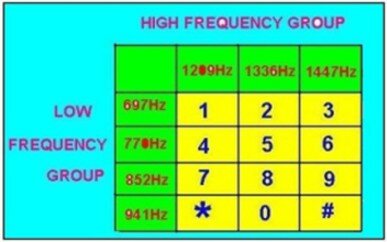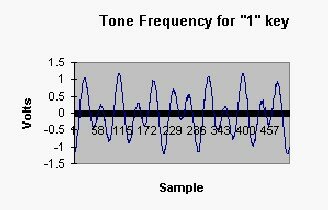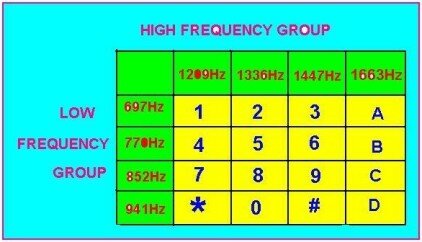Controlling devices using switches are common. From a few decades controlling devices using remote control switches like infrared remote control switch, wireless remote control switches, light activated switches re becoming popular. But these technologies have their own limitations. Laser beams are harmful to mankind. Some technologies like IR remote control are used for short distance applications. In such case if we have system which does not require any radiations or which is not harmful, long remote control switch!! Yes here is the solution. Here I am introducing such a system which does not require any radiations, any laser beam which has no limitation of range, I mean it can be used from any distance from meters to thousand kilometers using a simple telephone line or mobile phone.
Here I am using a telephone as a media, which serves main part of this system. By using home phone as a local phone and another phone – either landline or mobile phone as a remote phone we are controlling devices.
Features:-
- You can control up to 10 devices. It may be any electric or electronic appliances or devices with simple to heavy appliances. Each device is given a unique code.
- It makes accurate switching, any false switching of device are not done.
- There is no risk for false switching.
- Your local phone (i.e., home phone or office phone) can be used for normal use by using a DPDT switch. So you need not use a separate telephone line for this device controlling.
- To perform any operations through remote phone line, the user needs to dial to the local telephone (to which the interfacing circuit is connected) then the respective code of the device is dialed.
- This circuit does not require any complex IC, so any one with little knowledge of electronics can construct this circuit, because it does not need any programmable IC’s or programming.
- This system detects the ringing signal from your exchange with the help of ring detector and automatically switches ON.
- This device saves your money. This circuit switches OFF after a time of 60 seconds (you can change this switch ON-Time which is discussed in detail in coming section).
- Before changing the state of the device we can confirm the present status of the device.
- This circuit gives an acknowledgement tone after switching ON the devices to confirm the status of the device.
- You can control devices from local telephone. It can also be controlled by PCO.
Taking a tour of the project:
This system uses Dual Tone Multi Frequency (DTMF) technology of our telephone set. Every telephone set will have this facility. We have two type of dialing facilities in our telephone system (i) Pulse dialing mode (ii) Tone dialing mode. Here this system works on tone dialing mode. The DTMF mode is shortly called as tone dialing mode. (Check for availability of tone dialing mode in your telephone set).
This system is divided into two sections
1: Remote Section:
It is nothing but remote telephone set which is present in the remote place. This may be your workspace (office / school) phone or mobile phone or a phone in PCO. Signals are sent through this telephone.
2: Local Control Section:
This is a control system through which you can control your appliances. This contains one telephone line and a control unit. The appliances to be controlled must be connected to telephone line through control unit .Control unit is kept with a sufficient backup.
What is DTMF?
When you press a button in the telephone set keypad, a connection is made that generates a resultant signal of two tones at the same time. These two tones are taken from a row frequency and a column frequency. The resultant frequency signal is called “Dual Tone Multiple Frequency”. These tones are identical and unique.
A DTMF signal is the algebraic sum of two different audio frequencies, and can be expressed as follows:
f(t) = A0sin(2*П*fa*t) + B0sin(2*П*fb*t) + ……….. ——->(1)
Where fa and fb are two different audio frequencies with A and B as their peak amplitudes and f as the resultant DTMF signal. fa belongs to the low frequency group and fb belongs to the high frequency group.
Each of the low and high frequency groups comprise four frequencies from the various keys present on the telephone keypad; two different frequencies, one from the high frequency group and another from the low frequency group are used to produce a DTMF signal to represent the pressed key.
The amplitudes of the two sine waves should be such that
(0.7 < (A/B) < 0.9)V ——–>(2)
The frequencies are chosen such that they are not the harmonics of each other. The frequencies associated with various keys on the keypad are shown in figure (A).
When you send these DTMF signals to the telephone exchange through cables, the servers in the telephone exchange identifies these signals and makes the connection to the person you are calling.

When you press the digit 5 in the keypad it generates a resultant tone signal which is made up of frequencies 770Hz and 1336Hz. Pressing digit 8 will produce the tone taken from tones 852Hz and 1336Hz. In both the cases, the column frequency 1336 Hz is the same. These signals are digital signals which are symmetrical with the sinusoidal wave.

Along with these DTMF generator in our telephone set provides a set of special purpose groups of tones, which is normally not used in our keypad. These tones are identified as ‘A’, ‘B’, ‘C’, ‘D’. These frequencies have the same column frequency but uses row frequencies given in the table in figure (A). These tones are used for communication signaling.

Due to its accuracy and uniqueness, these DTMF signals are used in controlling systems using telephones. By using some DTMF generating IC’s (UM91214, UM91214, etc) we can generate DTMF tones without depending on the telephone set.

hello!
i want the fully detail of this project like circuit diagram, component,discription,blockdiagram,equilanant ICs list that used in this project and coding.
please……
i m very thankful to you…
Great project renjith!!!
pls give circuit diagram device control through telephone. using micro controller IC. IC 89S52
pls i would like see the circuit diagram and implementation of the project
it is too good but i want some more inf
sir,m doin this project but by usin mc-8951…can u mail me details if u hav any?
sir i m an engineering student..
i work on this project in my final sem..
but because of some errors in my program my project is not run..
will u please send me a program..
sir,my submission will be start from 14 april…
so,plz send me a prog. as fast as possible…
plz sir,,,,,
Hy –
i want the fully detail of this project like circuit diagram, component,discription,blockdiagram,equilanant ICs list that used in this project and coding.
please……
i m very thankful to you…
Sir I need the circuit and components urgently I cannot find it anywhere.please help.
Hi,
Doing MSC project and would
highly appreciate if you can send me the fully detail of this project
like circuit diagram, components,description,block diagram,equivalent
ICs list ,microproccesor used.
Kind request
Regards,
Bernard
I have visited your blog before. The more I visit, the more I keep coming back! ;-P
sir,i am doing a project on this
i need a fully detail on this project like circuit diagram, components,description,block diagram,equivalent ICs list that used in this project and coding., used.
hi, i need the coding 4 this project. pls send me the coding(program)……
Smart Idea ranjith !
Me too working on the same concept, can do me a favour? If you can send me its block and Circuit Diagram please.
Thanx,
looking forward for ur positive reply 😉
sir,
very very thanks
i need a fully detail on this project like circuit diagram, components,description,block diagram,equivalent ICs list that used in this project and coding., microcontrller programming for controlling devices
this is agood project.
i need this project.
hi…
how to make code on PIC simulator for automated appliances
controller using PIC16F84A
please answer my question.
how to make code on PIC simulator for automated appliances
controller using PIC16F84A
this is a very important project….i need your answer….
this is really good project please give the detail information and circuit diagram
Sir, please forward me the details of this project like circuit diagram and
further description of this project !
need a fully detail on this project like circuit diagram, components,description,block diagram,equivalent ICs list that used in this project and coding..its humble request
sir,
can u please provide the complete information reguarding this project. Iwould be pleased if u do so…..
sir
i want to know fully detail of ‘dtmf based remote control using telephone ‘project like name and description,equevalent ic’s list that used in this project and coding..its humble request
i am student of ece final year,i need the details of this project for minor project.pls mail me all data of this…
hi ranjith!!!!
really a must appreciable one!!it would create immense pleasure if i could get a clear idea of how u applying the concept..
thanking you!!
bye!!!
Sir,
I want to be a full information about this project,
How to make a circuit and other things which can clear my doubts.
Thank You !
Sir,
I want to be a full information about this project,
How to make a circuit and other things which can clear my doubts.
Thank You
sir i want the circuit diagram of this …. in order to learn it practically
how it works…
i will be very much thankful to u … if u forward me the circuit diagram and
further details on this topic….
hello!
i want the fully detail of this project like circuit diagram, component,discription,blockdiagram,equilanant ICs list that used in this project and coding.
please……
hello
i found the project extremely innovative and interesting..i am wanting to make
it for my college technical festival..it is just a month far from now..if you
could just help me out i would be very grateful..i just need a few tips and the
component list..ilive in india so advice me the appropriate devices..
i am extremely grateful to you..i would appreciate if you could reply as soon as
possible..
thank you
could you please mail me all details including circuit diagram.. i need it
please mail me the program and detail about project
Hi
I am doing a similar project.
Could you please mail me the design details including circuit diagrams
and snapshots(if available) of this project.
It would be of great help.
thanks
Wow….
I am interested to do this project for my home’s devices control so plz send me all details of this project with list all require components, circuit diagram, and details about how to do it…
I hope that you will send me all this detail earlier…
Thank you so much…
i want to make it, so plz send me all detail regarding this project.
I read all about this project and i like it so much, so can u plz send me all the details like circuit diagram, component used ,description and block diagram.Hoping for your reply as early as possible.
Thank you
hi i am using 89c2051 in this project which controls 8 relays and the controlling keys are 11,21—-81 to turn 1-8 relays and 10-80 to turn off.pls send me the program code for this as soon as possible.
sir,
can u send me the project to my mail id ovsureshbabu@gmail.com plz
hi, really very interesting project,please can you send me the full details of it,even every small detail,to work in one shot, my mail is vipinbali2010@gmail.com
thanks
vipin
plz send me all detail regarding this project.